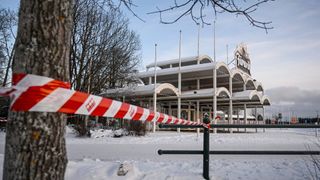Three chimps shot dead and four remain on the loose after mysterious zoo escape
The zoo is now being investigated for a breach of animal rights protections.

Three chimpanzees have been shot dead and four remain on the loose after mysteriously escaping from their enclosure in Sweden's Furuvik zoo.
The animals sprung themselves from their enclosure at midday on Wednesday (Dec. 14) to be met with gunfire from staff, who zoo officials claimed would have been put at considerable risk had they attempted to tranquilize the apes. One chimp was wounded by the bullets and returned to its enclosure by itself, but has so far been unable to receive medical attention, meaning that it could have died.
Furuvik zoo, situated around 104 miles (168 kilometers) north of Stockholm, had been closed for the end of the season when the chimps escaped by unknown means. The group, consisting of seven animals, are popular in Sweden and their deaths have sparked public outrage. Furuvik zoo has responded by insisting that the killings were necessary.
Related: Amazing video shows a mom chimp medicating her child's wound with insects
"Chimpanzees can be perceived as peaceful, but they are extremely dangerous. They are fast, very strong and generally fearless. It can quickly escalate into a life-threatening situation," The zoo wrote on its Facebook page on Thursday (Dec. 15). "Therefore, we unfortunately had to make the decision to euthanize three of the chimpanzees that had left their enclosure. This is not something we take lightly. The safety of people is always our top priority."
Three of the killed chimps have been identified by the zoo as Linda, Santino and Torsten. Linda, born in 1980, was brought to the zoo after her family was killed by poachers in Liberia. Santino was born in 1978 and was renowned for his love of art, as well as being the favorite chimp of Sweden's Crown Princess Victoria. (Both Victoria and her sister, Princess Madeleine, are believed to own paintings made by the ape.)
Torsten, a juvenile, was born in captivity in 2019 and was just 3 years old. His parents — Maria-Magdalena and Tjobbe — are among the three survivors. Another chimp, Manda, the adopted daughter of Linda, was heavily injured by the staffs' bullets and may have since succumbed to her wounds.
The park has defended the actions of its staff, claiming that they would have not been able to anesthetize the animals without endangering themselves.
"Anesthesia is not an option when a chimpanzee ventures outside its enclosure at risk to human safety," The zoo wrote on Facebook. "To shoot with an anesthetic arrow, you need to be very close to the animal. This, combined with the fact that it can take up to 10 minutes for the anesthetic to take effect, would mean a great danger to people's safety. When a chimpanzee is loose in the park, you therefore unfortunately have to shoot to kill."
The decision to euthanize the animals has received widespread opprobrium from Swedish animal rights organizations, the public and the press.
"It should not have been necessary to shoot the escaped apes," Ing-Marie Persson, a former caretaker who worked with the chimps for 30 years at the park told the Swedish newspaper Afton Bladet. "It is deplorable. So poorly done."
Swedish police confirmed on Thursday that the incident has been reported as a violation of Sweden's Animal Welfare Act, which says that animal enclosures have to be escape-proof.
"It is clear that this has not been the case," Jonas Eronen, a press spokesperson for the police, told the Swedish news site Ekot.
Chimps owe their formidable strength, which is 1.35 times greater than that of humans, in spite of their smaller size, to an increased quantity of fast-twitch muscle fibers responsible for strength and speed. While chimpanzees tend to be afraid of people in the wild, captive animals are far more accustomed to humans and therefore much more likely to attack. During attacks, chimps focus on peoples' faces, feet, hands and genitals. The Jane Goodall Institute UK notes that chimps are often unsatisfied and understimulated in human environments, increasing the danger they may pose to themselves and others.
Sign up for the Live Science daily newsletter now
Get the world’s most fascinating discoveries delivered straight to your inbox.

Ben Turner is a U.K. based staff writer at Live Science. He covers physics and astronomy, among other topics like tech and climate change. He graduated from University College London with a degree in particle physics before training as a journalist. When he's not writing, Ben enjoys reading literature, playing the guitar and embarrassing himself with chess.
Most Popular


By Emma Bryce